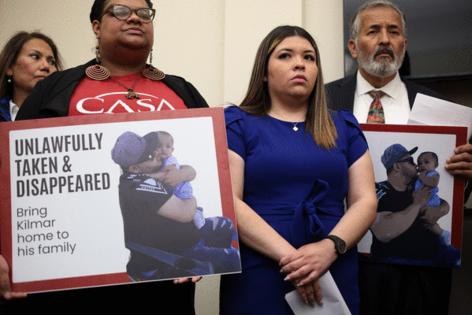Judge says Trump officials likely in contempt over deportations
Published in News & Features
A federal judge said there is sufficient evidence to hold the Trump administration in criminal contempt of court for sending accused Venezuelan gang members to an El Salvador prison last month despite his order to immediately halt the deportations.
U.S. District Judge James Boasberg issued an order Wednesday saying that officials acted in “willful disregard” of his verbal order on March 15 to turn around planes carrying Venezuelans now held in a notorious prison in El Salvador. Boasberg said at a court hearing on April 3 that “the government acted in bad faith throughout that day.”
“This behavior indicates ‘deliberate or reckless disregard’ of the order,” the judge wrote, “leading this court to conclude that there is probable cause that defendants willfully disobeyed a binding judicial decree.”
Boasberg stopped short of holding any specific officials responsible for now. He said he would give the administration a chance to come into compliance with his earlier order — potentially by ensuring that the people in the Salvadoran prison will be able to ask a federal judge in the U.S. to order their release.
If not, Boasberg said he would identify the individuals to refer to the U.S. Justice Department for possible criminal prosecution.
The order was issued despite a Supreme Court ruling on April 7 that tossed out Boasberg’s order pausing the deportations.
The case is one of the highest-profile fights between the Trump administration and a judge weighing one of more than 190 lawsuits that seek to slow his agenda. Boasberg’s action comes after Donald Trump called for Boasberg’s impeachment, prompting a rebuke from Chief Justice John Roberts.
On March 15, Trump invoked the law to deport alleged members of Tren de Aragua gang under the Alien Enemies Act of 1798, a wartime statute. The law was previously used only in the War of 1812, World War I and World War II. Boasberg put the removals on hold that day over concerns about due process, triggering a battle over the president’s authority to invoke the law.
Just after midnight on March 15, five Venezuelans sued in anticipation of Trump using the Alien Enemies Act. That morning, Boasberg temporarily barred deportation of those five. At 3:53 pm, Trump made public a proclamation invoking the law. By then, the U.S. prepared to fly more than 200 people on three planes from southern Texas.
Boasberg had a second hearing that day, ordering a Justice Department lawyer, Drew Ensign, to tell immigration officials to immediately turn around any flights. But two flights proceeded anyway, despite the judge taking a break so that the lawyer could convey his order to Justice Department and immigration officials. A third flight left after his oral order.
At a hearing on April 4, Boasberg pressed Ensign for the names of everybody he communicated with about his order that day. Ensign named seven officials at the Justice, State and Homeland Security departments who may have learned of the judge’s order.
Justice Department lawyers have previously said they didn’t have to comply with Boasberg’s oral order on March 15 because he soon issued a written order that didn’t direct the planes to turn around.
The case is J.G.G. v. Trump, 25-cv-766, U.S. District Court, District of Columbia (Washington).
----------
With assistance from Greg Stohr, Zoe Tillman and Erik Larson.
©2025 Bloomberg L.P. Visit bloomberg.com. Distributed by Tribune Content Agency, LLC.







Comments